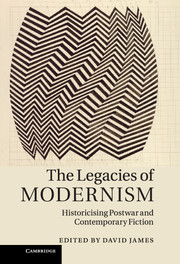Book contents
- Frontmatter
- Contents
- Notes on contributors
- Acknowledgements
- Introduction: mapping modernist continuities
- Part I Early legacies: inheriting modernism at mid century and beyond
- Part II Modernist aesthetics in transition: character, perception, innovation
- Part III Reassessing the ethics of modernist fiction
- Part IV Modernism's global afterlives
- Chapter 11 Fictions of global crisis
- Chapter 12 Representing slums and home: Chris Abani's GraceLand
- Chapter 13 For translation: Virginia Woolf, J. M. Coetzee and transnational comparison
- Epilogue Finding the dreadfully real
- Index
- References
Chapter 13 - For translation: Virginia Woolf, J. M. Coetzee and transnational comparison
from Part IV - Modernism's global afterlives
Published online by Cambridge University Press: 05 November 2011
- Frontmatter
- Contents
- Notes on contributors
- Acknowledgements
- Introduction: mapping modernist continuities
- Part I Early legacies: inheriting modernism at mid century and beyond
- Part II Modernist aesthetics in transition: character, perception, innovation
- Part III Reassessing the ethics of modernist fiction
- Part IV Modernism's global afterlives
- Chapter 11 Fictions of global crisis
- Chapter 12 Representing slums and home: Chris Abani's GraceLand
- Chapter 13 For translation: Virginia Woolf, J. M. Coetzee and transnational comparison
- Epilogue Finding the dreadfully real
- Index
- References
Summary
The transnational legacy of literary modernism typically begins with idiom. Early twentieth-century novelists, from James Joyce and Virginia Woolf to Ernest Hemingway and Zora Neale Hurston, replaced the heroic lexicons of patriotism and imperial confidence with explicit language and the syncretic vocabularies of cosmopolitanism and regionalism. Among late twentieth-century novelists, a revival of idiomatic modernism is not far to seek: think of the ‘chutneyfication’ of English in Salman Rushdie's Midnight's Children (1981), East, West (1994) and The Satanic Verses (1988); the use of syntactic infelicity and translated speech in Kazuo Ishiguro's A Pale View of Hills (1982) and An Artist of the Floating World (1986); and the play of accented voices in Irvine Welsh's Trainspotting (1993) and Zadie Smith's White Teeth (2000). These works deploy the vernacular resources of English to explore the politics of language in an age of decolonisation, multiculturalism and global migration. They are indebted to modernist precursors because, like Ulysses (1922) and Mrs. Dalloway (1925), they suture narrative events to the sound and sense of Anglophone words. A modernist work such as Ulysses is difficult to translate, the novelist and translator Tim Parks has remarked, because it appears as ‘a thing made of language’. The same may be said of Midnight's Children and A Pale View of Hills, whose ‘accented’ English signals the transnational circulation of their narrators but does not itself circulate into other languages with ease.
This itinerary of modernist transnationalism appears persuasive if one looks forward from the major works of the early twentieth century, but it seems more limited from the perspective of the present. It doesn't satisfactorily explain contemporary novels whose treatment of multilingualism and transnational collectivity eschews idiom but embraces other modernist strategies such as parataxis, recursive narration and collage. And it misses altogether contemporary novels that resist homogeneous collectivities but nevertheless welcome, accept or accommodate translation. What do translatable novels tell us about the afterlives of modernist transnationalism?
- Type
- Chapter
- Information
- The Legacies of ModernismHistoricising Postwar and Contemporary Fiction, pp. 243 - 263Publisher: Cambridge University PressPrint publication year: 2011



